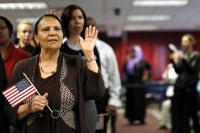Proposed Senate Bill Addresses Many, But Not All, Catholic Concerns
The daunting 844-page immigration bill introduced last month in the U.S. Senate is anything but simple. But does it provide the solution to the many problems we face here in the United States? More specifically, how would this bill measure up to the hopes widely communicated by the United States Conference of Catholic Bishops (USCCB)?
The Catholic Church, a church of immigrants, has expressed and utilized its right to voice concern and advocate for a just perspective on immigration reform. The USCCB, in the pastoral letter, Strangers No Longer: Together on this Journey of Hope, states that "[w]hen persons cannot find employment in their country of origin to support themselves and their families, they have a right to find work elsewhere in order to survive. Sovereign nations should provide ways to accommodate this right." The Bishops made clear that the "[m]ore powerful economic nations…have a stronger obligation to accommodate migration flows."
The USCCB, via the Office of Migration Policy and Public Affairs, addresses five main hopes for change in regard to comprehensive immigration reform: earned legalization, family-based immigration, restoration of due process rights, addressing root causes and enforcement.
According to the United States Citizen and Immigration Services (USCIS), nearly 40 million documented immigrants and 11.6 million undocumented immigrants reside in the U.S. Naturally, the USCCB is concerned about the dignity of undocumented immigrants and hopes for “an earned legalization program (that) would allow foreign nationals of good moral character who are living in the United States to apply to adjust their status to obtain lawful permanent residence.”
The “Gang of Eight” Bill, named after the bipartisan group of senators that produced the legislation, would certainly accomplish the hope of a path to legalization. The process would not be simple or immediate, however. Eligible undocumented immigrants would be able to apply for once renewable Registered Provisional Immigrant (RPI) status. This proposed status would provide work and travel authorization as well as protection from detention or removal proceeding due to immigration status.
Eligibility requirements would include continuous presence since Dec. 31, 2011, and an assessment of criminal convictions. After 10 years of RPI status, RPI’s would be eligible to apply for Legal Permanent Resident Status (LPR) and, following three years of LPR status, be eligible for U.S. citizenship.
Two groups would be given a faster alternative to LPR status, resulting in faster naturalization. DREAMers - alien minors who were given a bit of relief with the Differed Action for Childhood Arrivals - would have a more direct, less time consuming route to residency and ultimately naturalization, but would endure education requirements. In addition, for those undocumented immigrants who work seasonally in the agriculture sect, the bill includes a path to LPR status via a “Blue card” with a shorter wait time, a similarity with the DREAMers.
In conjunction with agriculture-specific changes, the bill proposes a new and expanded system for work visas, including contract labor and agriculture visas.
The USCCB has also pushed for changes in family-based immigration, hoping to “reduce family reunification waiting times.” The recently revealed bill would expand types of family members eligible for immediate immigration, meaning they would not be subject to any native-country-based quota. In addition, Legal Permanent Residents would be able to petition for certain family members to immigrate.
The potential expansion of family-based immigration and expanded work-visas would fulfill the hopes of the USCCB, that the U.S. government would find a way to enforce such laws, while creating a realistic way for laborers and other workers to immigrate and visit. These changes, in conjunction with an ambitious Employment Verification System and aggressive border control expectations, would contribute to the enforcement hopes of the USCCB.
The bill delegates certain tasks to certain government departments. The USCCB’s hope that comprehensive immigration reform would plan to restore due process rights may or may not be fulfilled. The bill at hand would specifically charge the Department of Homeland Security to “evaluate how the policies, strategies and programs of Federal agencies operating along the international borders between the United States and Mexico and between the United States and Canada protect the due process, civil and human rights of border residents, visitors and migrants at and near such border.”
The only main concern detailed in the USCCB’s list of hopes for immigration reform that is not covered in the bill is “Addressing Root Causes.” It is the hope of the USCCB that Congress will examine the root causes for migration, specifically the economic development issues that are so often the root cause of poverty, danger and intense crime. These issues are not addressed by the proposed bill.
Since the bill was unveiled only a few weeks ago, there have been various attacks and even more suggestions for potential changes. The Senate has started their journey to repair a broken system that has not been updated in decades. The House now has two bipartisan groups, each initiating their own process.
Parishioners who would like to express their support and hopes for comprehensive immigration reform are encouraged to visit www.justiceforimmigrants.com (JFI) for directions on how to express your support, suggestions and appreciation. Another way to get involved is to pray the following:
Blessed are you, Lord God, King of All Creation. Through your goodness, we live in this land that You have so richly blessed. Help us always to recognize our Blessings come from You and remind us to share them with others, especially those who come to us today from other lands. Help us to be generous, just, and welcoming, as You have been and are generous to us.
Cesilie Cordovilla serves as Multicultural Liaison for Catholic Charities of Evansville.


